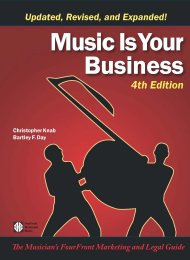It's 2010, Not 1980...
It's 2010 and in the last week alone I've had 11
emails or phone messages from musicians asking me to help them "get a
record deal".
What's with that!!??
Stop trying to shop for “deals”, and start learning how to market you own music!
What do you need to do first? Get to know who your fan is.
Your Fans Are Your Assets
Make
it your major goal to study who the people are that come to see your
live shows, buy your CDs, download your music, read your Tweets,
Facebook and MySpace postings, purchase your merchandise, and visit
your website.
These are the people who are the most valuable assets you have outside of the 'great' songs you have written.
Studying
the lifestyles of your fans will give you a passport to making money
with your music. Why? Because when you discover who they are in great
detail, their habits and lifestyles will inspire ways of reaching them
you never imagined.
For example, haven’t you seen hundreds of
entertainment products and other merchandise for sale at places other
than the obvious stores? You know, stuff like the action figures
associated with some mega movie promotion given away with a hamburger.
Or, how about those special deals when you subscribe to this, that, or
the other. Or you get a free book or discount coupons good for movie
tickets. Well, behind each of these special promotions is 'customer
research.'
To help you get into the same kind of mindset as any
professional marketer, here are some questions for you to ponder
regarding your fans.
- How old are they? (determine the widest range of their ages)
- What gender are they? (if both, what percentage is dominant, or is it even?)
- Are they one specific ethnic background or a mix of backgrounds?
- Do they drive cars to work, or do they carpool, take public transportation, ride bikes, or walk?
- If they go to school, what kind of schools do they go to?…grade schools, high schools, colleges, business schools, universities?
- Are they religious people, or spiritual seekers, or atheists?
- What political parties do they belong to, and what if any causes do they champion?
- If they go out to dinner, what kind of restaurants do they go to…fancy and expensive places or fast food restaurants?
- Where do they shop for clothes…Value Village, Kmart or Nordstroms?
- Whatkind of hobbies and other interests beside music do they have… mountain climbing, hiking, jogging, boating, other sports activities?
- What other music do they like…particularly what other bands and artists do they spend their money on?
- What kind of movies do they go see in theaters, and/or rent or buy?
- When they travel, do they go by car, bus, train, or plane?
- What books might they enjoy reading? e-books? and where would they buy them?
- What kind of volunteer work might they do…work in hospitals, fairs and festival volunteers, church groups, youth clubs?
- What TV shows might they watch, and what radio stations do they listen to?
- What websites do they visit and blogs do the subscribe to, on a regular basis?
OK.
now, how do you begin finding out all the answers to these questions?
Well, a client came to me one time and told me that for 2 years they
had been videotaping their live shows to watch at rehearsals, so they
could see what their stage appearance looked like from the audience’s
point of view. I applauded this habit, but told them that after 2 years
of doing that they should turn the video camera around and videotape
their audience!
A picture is worth a thousand words, right? So,
studying your audience for awhile should give you some big clues to
their lifestyles. You will see their ages and genders, their hairstyles
and clothing, and if you look between the lines you can make some
pretty good educated guesses on some of the things I have suggested in
the questions listed above.
In the beginning you will have to
get use to this new habit of studying your fan. Give it time. After
awhile your ongoing survey of who they are will begin to tell its tale,
and before long you will be thinking like a professional marketer.
When
you see that most of your audience are 18-25 for example, are more male
than female, are in community colleges or enrolled in a university
nearby, and buy their clothes at second hand stores…then you can find
some fun and exciting promotion and marketing ideas that may catch
their attention. Like, concentrate your live shows on having house
parties, or playing campus venues, and blanketing the campuses with
posters and flyers. Get a campus organization to sponsor one of your
shows, get a listing or a story about your act in the college paper,
and partner with a local record store (god knows they need all the help
they can get these days) to sell your concert tickets and offer a
dollar off your CD when they buy a concert ticket. Make your show a
partial benefit for that charity second hand clothing store, so that
they can promote your show with posters and handouts to their
customers, and have a small display at their checkout counter for your
CD at the clothing store too. (But don’t forget to sell your CD and
other merchandise at all your shows, and have your e-mail list
available for the new fans to sign up for).
If your fan research
shows that you have fans who are older, you will have to go a different
route. Let’s say they are females, 25-39 and live an alternative
lifestyle that includes having groups of friends over for a book club
discussion, listening to acoustic music, and preferring tea to coffee.
Then think about doing what I call ‘tell a friend’ acoustic home
concerts. You select a fan to host a show at their home and invite
their friends to attend for free. You make your money by selling your
CDs and other merchandise to an ever-expanding fanbase.
Also,
put a ‘customer survey’ on your website. Ask them to fill out the
survey, and perhaps thank them with a free song download, or a discount
off your CDs…whatever…just do it!
So, there you go. The list of
promotional ideas and inspirations for creative self-marketing are
endless, when and if you know who your customer is. The best
independent labels out there are thinking this way all the time. That
is why you may have seen hip hop CD compilations for sale at shoe
stores, or found CD samplers given away at grocery stores.
Your
customer is really not that much different than you. Just start paying
attention wherever you are, and wherever they are and watch how other
products are being sold and marketed. The customers are out there, but
they have a lot to choose from, so get your music to them in fun and
creative ways.
Your fans will never let you down once you get the lowdown on them.



